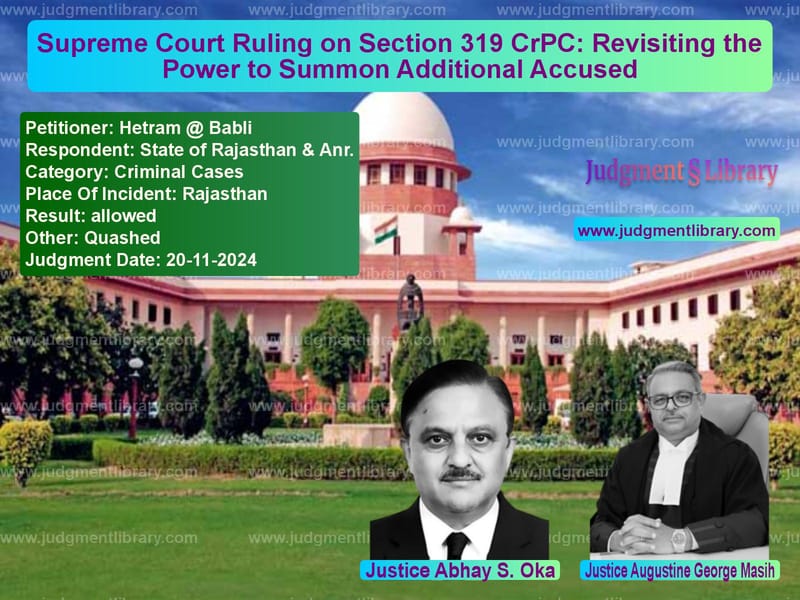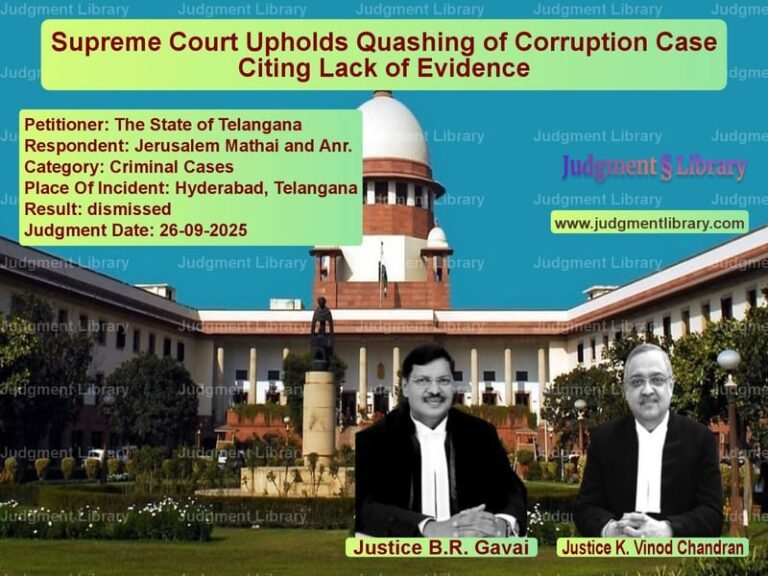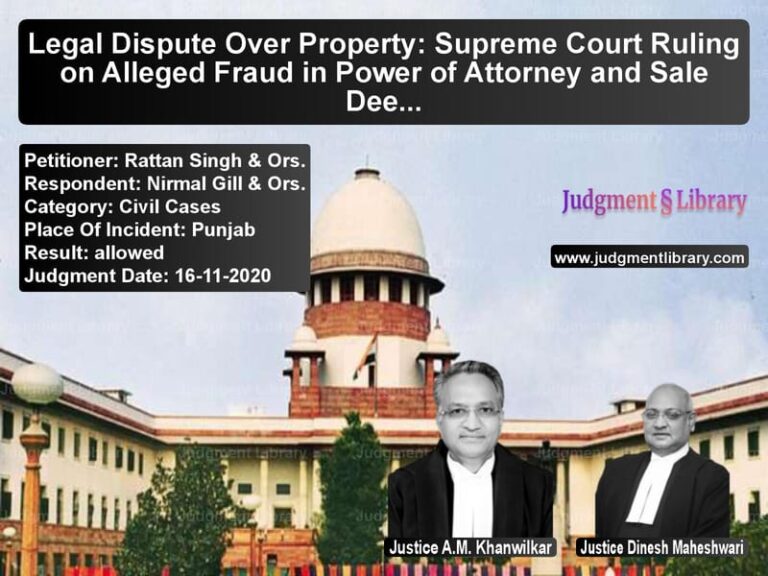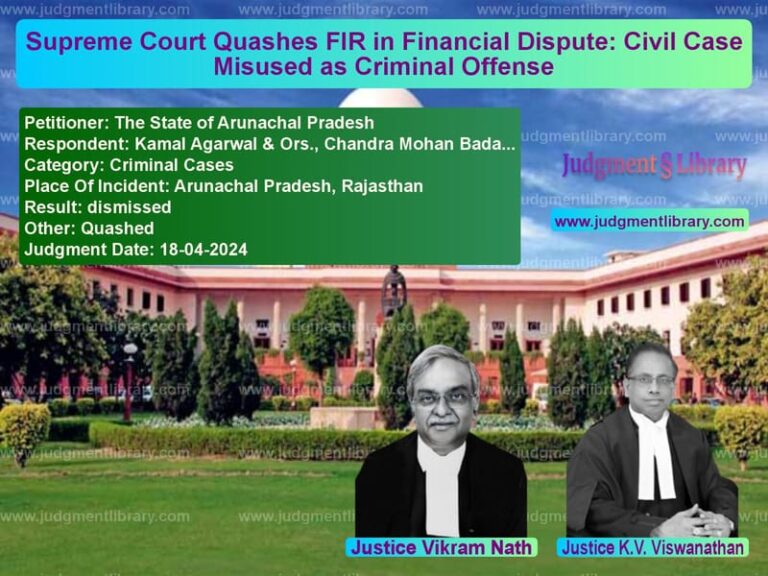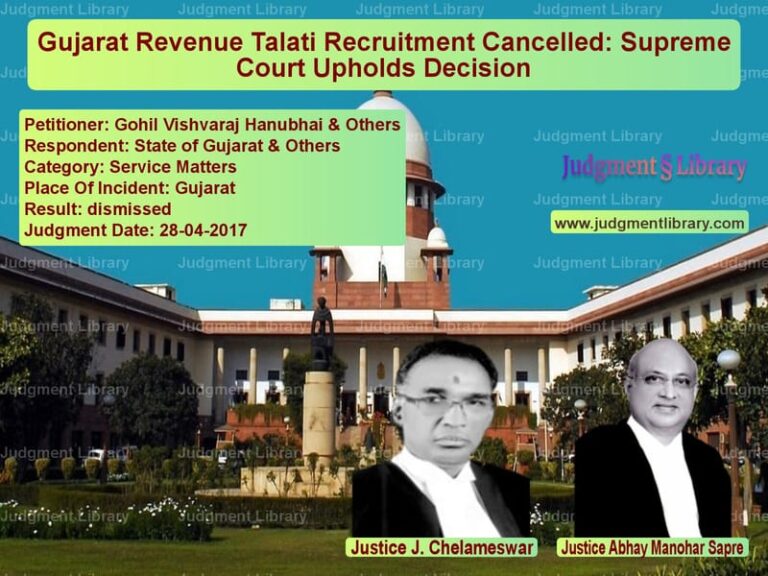Supreme Court Ruling on Section 319 CrPC: Revisiting the Power to Summon Additional Accused
The Supreme Court recently delivered a significant ruling in the case of Hetram @ Babli vs. State of Rajasthan & Anr., addressing the application of Section 319 of the Code of Criminal Procedure (CrPC), 1973. This judgment clarifies when and how courts can summon additional accused persons during an ongoing trial, particularly considering contradictions in witness testimonies.
Background of the Case
The dispute began when the complainant filed an application under Section 319 of the CrPC before the Sessions Court, seeking to summon the appellant, Hetram @ Babli, as an additional accused. The complainant relied on the deposition of two witnesses, PW-2 (Sona) and PW-4 (Seema), who claimed in their examination-in-chief that they had seen the appellant striking the deceased on the left side of his head with a spade.
However, the Sessions Court rejected the application, ruling that there was no prima facie material to justify summoning the appellant. The complainant then moved the Rajasthan High Court, which allowed the revision petition and directed the lower court to summon the appellant as an additional accused. The appellant, dissatisfied with this order, approached the Supreme Court.
Legal Issues Raised
- Whether the High Court was justified in allowing the application under Section 319 CrPC after the Trial Court had rejected it.
- Whether contradictions in the witness testimonies affected the applicability of Section 319.
- The correct standard of evidence required for invoking Section 319 CrPC.
Petitioner’s Arguments
- The appellant argued that the witnesses’ testimonies were contradictory, and their cross-examination revealed significant omissions regarding his alleged involvement.
- It was contended that the High Court failed to consider the contradictions and omissions in witness depositions while exercising its revisional jurisdiction.
- The Supreme Court’s earlier ruling in Hardeep Singh v. State of Punjab (2014) was cited to argue that the evidence required under Section 319 CrPC should be more than a mere prima facie case.
Respondent’s Arguments
- The State of Rajasthan argued that the power under Section 319 CrPC must be exercised if the witness’s examination-in-chief, taken at face value, would result in the conviction of the accused.
- It was contended that the High Court correctly applied the precedent set in Hardeep Singh’s case, where the Supreme Court had ruled that the trial court need not consider cross-examination before exercising its powers under Section 319.
- The complainant further argued that the Trial Court had erred in refusing to summon the appellant despite clear allegations in the examination-in-chief.
Supreme Court’s Analysis
The Supreme Court examined the correctness of the High Court’s decision in light of the principles established in Hardeep Singh v. State of Punjab. The Court made the following key observations:
1. The Importance of Contradictions in Witness Testimony
The Supreme Court emphasized that witness statements in the examination-in-chief must be evaluated in conjunction with their cross-examination. In this case, PW-2 and PW-4 had provided contradictory statements during cross-examination, leading the Court to conclude:
“The allegation made in the examination-in-chief, when tested through cross-examination, reveals material omissions amounting to contradictions. In such circumstances, no court could have recorded satisfaction that a prima facie case exists.”
2. Clarification on Section 319 CrPC Standards
The Court reiterated that the test under Section 319 is stricter than the one applied at the stage of framing charges. It ruled:
“The test to be applied under Section 319 CrPC is that if the evidence goes unrebutted, it must be capable of leading to conviction. Mere allegations in the examination-in-chief, contradicted during cross-examination, cannot satisfy this test.”
3. The Timing of an Application Under Section 319
The judgment also provided clarity on the timing of such applications. While the complainant argued that cross-examination was irrelevant, the Supreme Court held:
“When an application under Section 319 is made after the cross-examination of key witnesses, the court must consider the contradictions that emerge. It would be unjust to ignore cross-examination when evaluating whether to summon an additional accused.”
Final Judgment
- The Supreme Court set aside the Rajasthan High Court’s order dated February 8, 2023, which had directed the summoning of the appellant.
- It ruled that the omissions in witness testimonies were significant enough to amount to contradictions, making it impossible to justify the exercise of power under Section 319 CrPC.
- The revision petition filed before the High Court was dismissed.
- The appeal was allowed, and the appellant was not required to appear as an additional accused.
Implications of the Judgment
- Higher Standard for Summoning Additional Accused: The ruling clarifies that contradictions in witness testimonies must be considered before invoking Section 319 CrPC.
- Protection Against Arbitrary Summoning: The decision ensures that accused persons cannot be dragged into trials solely based on unverified or contradictory statements.
- Guidance on the Role of Cross-Examination: The judgment affirms that courts must consider cross-examinations before exercising powers under Section 319 CrPC.
- Stronger Judicial Precedents: The ruling reinforces the principles established in Hardeep Singh’s case, preventing the misuse of Section 319 CrPC.
This judgment will serve as a significant precedent in criminal law, providing a safeguard against arbitrary prosecution and ensuring that only individuals with credible prima facie involvement in a crime are summoned during a trial.
Petitioner Name: Hetram @ Babli.Respondent Name: State of Rajasthan & Anr..Judgment By: Justice Abhay S. Oka, Justice Augustine George Masih.Place Of Incident: Rajasthan.Judgment Date: 20-11-2024.
Don’t miss out on the full details! Download the complete judgment in PDF format below and gain valuable insights instantly!
Download Judgment: hetram-@-babli-vs-state-of-rajasthan-&-supreme-court-of-india-judgment-dated-20-11-2024.pdf
Directly Download Judgment: Directly download this Judgment
See all petitions in Bail and Anticipatory Bail
See all petitions in Attempt to Murder Cases
See all petitions in Judgment by Abhay S. Oka
See all petitions in Judgment by Augustine George Masih
See all petitions in allowed
See all petitions in Quashed
See all petitions in supreme court of India judgments November 2024
See all petitions in 2024 judgments
See all posts in Criminal Cases Category
See all allowed petitions in Criminal Cases Category
See all Dismissed petitions in Criminal Cases Category
See all partially allowed petitions in Criminal Cases Category

